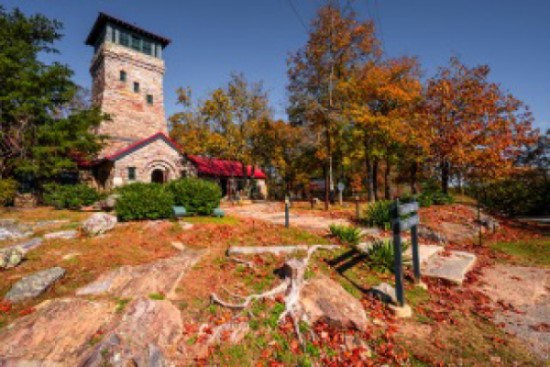Adventure
Appalachian Trail: Manifest Destiny We Can Get Behind

This is the kind of “manifest destiny” I can support.
Alabama or Bust!
Did you know legendary conservationist Benton MacKaye’s original vision for the Appalachian Trail (AT) called for it to run the entire length of the Appalachian Mountains by linking Maine and Alabama? Conservationists in Alabama and Georgia have been working for the last few decades to turn this dream into a reality by adding approximately 314 miles of the Pinhoti Trail to the iconic AT. One day, hopefully, they’d like to place the AT’s southern terminus at Cheaha State Park, the state’s highest peak.
“There’s something magical about the idea of linking Maine’s highest peak with Alabama’s highest mountain,” said ADCNR Commissioner Chris Blankenship. “Hikers who complete this feat would have the satisfaction of having traveled the entire length of the Appalachian Mountains in America, and it would also realize Benton MacKaye’s original idea of linking Maine with Alabama.”
The Pinhoti Trail meanders through several Alabama counties, both north and south of Cheaha, mostly through the Talladega National Forest. The trail continues into north Georgia via the Georgia Pinhoti Trail, traversing the Chattahoochee National Forest and ultimately connecting with the Benton MacKaye Trail. The Mackaye trail provides the final link to the current southern terminus of the AT at Springer Mountain, Georgia.
Extending the AT into Alabama may require amending federal law and navigating federal bureaucratic obstacles, but that hasn’t deterred advocates from working to make this extension a reality. In recent years Alabama has seen more and more of annual thru hikers start their journeys in Alabama.
“That is really the point behind our efforts. We have worked over the years to buy missing properties in Alabama for the trail, like Indian Mountain, and see trail constructed, and now the word has gotten out and hikers are showing up and making independent decisions to start their thru hike in Alabama” said State Parks Director Greg Lein.
Lein has thru hiked the Appalachian Trail and appreciates the idea of fulfilling Benton MacKaye’s vision. “We simply want to support thru hikers who wish to attempt their start or finish their personal journey in Alabama, and Cheaha State Park is an easy and convenient place to support hikers,” he said.
District Superintendent Renee Raney supported the concept: “Cheaha State Park has a store, lodge, cabins and a campground which are all ready to serve and support hikers and their families embarking on this great adventure. The milder winter and spring conditions in Alabama certainly make for a better starting option in February, March or April when the northbound thru-hiking pilgrimage typically gets underway.”
After all, there is plenty of precedent. The AT’s southern terminus has changed several times, from its original location at Mount Mitchell in North Carolina to its current location at Springer Mountain in Georgia. The northern terminus also moved from Mount Washington in New Hampshire to Mount Katahdin in Maine.
Moving the southern gateway of the Appalachian Trail to Mount Cheaha would not only help alleviate current AT congestion, but provide a new economic and tourism engine for areas of Georgia and Alabama. The AT currently stretches 2,190 miles and, with its extension to Mount Cheaha, it would become 2,504 miles long.
“Hikers can now purchase a medallion for $10 from the Cheaha campstore that can be put on their packs to show their support for extending the world-famous Appalachian Trail to Alabama,” said Tom Cosby, an advocate for the AT2AL movement.
T-shirts and stickers with the AT2AL message can be found in the campstore as well, and all proceeds will benefit the Alabama State Parks. “Our goal is simply to raise awareness in the hiking community that bringing the AT to Alabama is, really, a culmination of Benton Mackaye’s original dream from 1925 — and a reminder that the Appalachians begin in Alabama,” Cosby said.
Dr. Jeff Hayes, a fellow advocate for the AT2AL movement, also shared supportive sentiments.
“I grew up hiking in Alabama, thinking the trails here were nothing special,” Hayes said. “After attending college in Maryville, Tennessee, and hiking extensively in the Smokey Mountains, then later hiking the full length of the Appalachian Trail, I realized that those trails, while older and more developed, are no more special than ours. Then when I hiked the entire Alabama section of the Pinhoti for the Pinhoti Steering Committee, I became convinced that our Appalachians, too, are on par with those along many sections of the Appalachian Trail.
“We should bring the Appalachian Trail to Cheaha State Park, a worthy peer to Baxter State Park, both holding the highest point in their respective states,” he added. “We should do this not just because the visionaries who gathered in the first Appalachian Trail Conference in 1925 thought the Appalachian Trail should extend to Cheaha, but because leaving out the Southern Appalachian deprives hikers – day hikers, weekenders, and long-haul – of the full range of scenic Appalachian beauty. The Appalachian Trail is incomplete without our mountains. Let’s finish the job started almost 100 years ago and bring the Appalachian Trail home to Alabama.”











